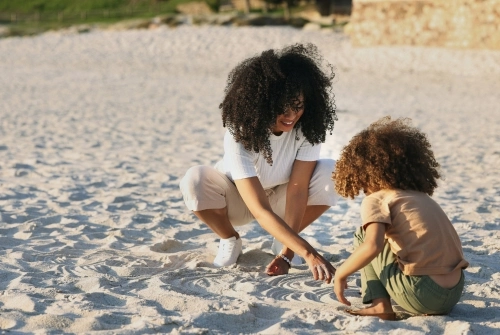From a crisp spring beach vacation to a hot summer beach trip, the welcomed beach season is one we all look forward to at Primary Beginnings. But ask yourself: Am I fully prepared for a beach vacation with your little one? If the answer is “No” or “I’m not sure,” our preschool staff at Primary Beginnings in Raleigh, NC are here to share several beach safety tips that will make your next seaside escape fun and safe. From the basics, such as wearing sunscreen to dealing with new experiences, these tips will take you to the sea with confidence.
Common Beach Emergencies for Children
You can’t always predict what will happen on vacation, so you won’t ever be prepared for every possibility. Still, there are a few beach-related scenarios you can anticipate with the right beach safety tips.
Sunburn
If your skin hasn’t seen the warm sun since last season or you’re prone to burning easily, it’s important to apply sunscreen with an SPF of 30 or more every few hours to prevent burns. Even waterproof sunscreens need to be reapplied as children may lose sunscreen as they sweat, rub their arms, and towel off. So when it comes to beach safety tips, sun protection is always top of mind.
If your child does suffer a sunburn, begin with a cold shower and follow up with an aloe gel treatment. Hopefully, the burn isn’t too severe, but if you’re worried that you need medical attention, look for these signs: Intense pain, a fever with chills, nausea, or blistering. If you have any concerns about your child’s sunburn, take a precautionary trip to the local urgent care facility.
Dehydration
Both intense heat and the inevitable swallowing of salt water can cause dehydration. To prevent dehydration, pack a cooler with water bottles, especially if you plan to stay on the beach for several hours. Another helpful tip is to pack fresh fruit as it’s chock full of water! Our warm-weather favorites are watermelon, grapes, and berries.

By ensuring your child drinks enough water and consumes food that offers extra hydration, you’ll avoid dehydration. According to the Academy of Nutrition and Dietetics, children aged 4-8 need 5 cups of water a day, so it’s crucial to have plenty of water readily available to replenish lost fluids and prevent dehydration when at the beach.
Bug Bites
Whether it’s night or day, you should be on the lookout for mosquitos when at the beach, as these pests can pose health risks. Mosquitoes are carriers of various diseases, including West Nile virus and Zika virus, and can transmit them through their bites. Even in areas where these threats are minimal, nothing ruins a night on the water faster than swarms of unrelenting bugs.
To prevent mosquito bites, keep bug spray on hand, especially during the early morning and evening when mosquitoes are most active. Reapply throughout the day and night, especially after time in the water or sweating.
If a mosquito bite occurs, apply over-the-counter anti-itch creams or ointments containing ingredients like hydrocortisone that can help alleviate itching and reduce inflammation. Cold compresses can also provide relief by numbing the affected area.
Jellyfish Stings
When it comes to beach safety tips, jellyfish stings are often overlooked. Unfortunately, jellyfish stings are more common than you may think, so being prepared is just as important as bringing sunscreen and extra water. Jellyfish tentacles contain stinging cells that can release venom upon contact, leading to painful stings.
Most jellyfish stings aren’t serious and may have effects similar to bug bites. Others may cause children to break out in hives. If this is the case – don’t be alarmed! First, soaking the affected area in vinegar can help calm symptoms. Benadryl or hydrocortisone creams can also help calm the irritation, which should disappear in a couple of days.
Serious symptoms of a jellyfish sting requiring medical attention include nausea or vomiting, weakness, severe muscle aches, or difficulty breathing.
Swimming Struggles
The best way to prevent drowning is through swim lessons. You can use the off-season to enroll your child in swim classes or teach them how to swim yourself if you prefer at your local, indoor pool facility. If you’re ready for your beach trip now and your child isn’t of swimming age or hasn’t been taught to swim, that’s okay! They can still enjoy the beach safely — Just make sure they are properly equipped. Life vests are the best way to keep kids afloat in the pool or ocean. Floaties and buoyant noodles, on the other hand, may slip away in the ocean. Life vests also allow your child to move freely while keeping them afloat and enforcing correct form for when they are ready to learn how to swim.
Beach Safety Tips for Before You Set Foot on the Beach
Even before you hit the sand, there are a few steps you should take to ensure children have a blast while staying safe during beach trips.
Check the Weather and Tide Conditions
Before heading to the beach, check the weather forecast and tide conditions. Avoid going on days with rough seas, storms, or high tides, as these can pose significant risks to children.
Sun Protection
Protecting your child from the sun is crucial. Pack sunscreen with a proper SPF, hats, sunglasses, and UV-protective clothing. Apply sunscreen before heading out, and reapply throughout the day, especially after swimming.
Swim Lessons
If you have the opportunity, enroll your child in swim lessons early to ensure they have basic water safety skills. Knowing how to float, tread water, and swim can make a bigger difference than all of the beach safety tips combined.
Stock Up
Along with sun protection and any swim-aids your children may use, consider creating a checklist with some of the following when packing for a beach trip.
- Life Jackets: For younger children or those who are not confident swimmers, bring a properly fitted life jacket. This extra layer of buoyancy provides added safety, especially in the unpredictable ocean environment.
- Beach Toys: Pack beach toys like buckets, shovels, and floaties to keep your child engaged in safe, age-appropriate activities. Avoid bringing toys that can pose a choking hazard or those with sharp edges.
- Snacks and Hydration: Keep your child well-hydrated and energized with plenty of water and healthy snacks. As previously mentioned, dehydration can occur quickly in the sun, so make sure to take regular breaks for fluids and shade.
Beach Safety Tips
Once you make it to the beach, keep some of these beach safety tips in mind and keep your mind at ease.
Continuous Supervision
It may seem obvious, but never leave your child unsupervised at the beach, even if they are strong swimmers. Designate a specific meeting point in case someone gets separated, and keep a watchful eye on them at all times.
Stay within Designated Swimming Areas
Choose beaches with designated swimming areas and lifeguards whenever possible. Teach your child to stay within these boundaries and not to venture too far from shore.
Educate about Rip Currents
Inform your child about the dangers of rip currents and how to identify them. Teach them to swim parallel to the shore if caught in a current and to signal for help by raising an arm. However, if you’ve kept a keen eye on the weather and avoid the beach during potentially problematic times, you’ll likely avoid any rip currents.
Don’t Run on Wet Surfaces
The combination of sand and water can create slippery surfaces. Remind your child not to run on wet sand or rocks to prevent slips and falls.
Respect Marine Life
Play a nature documentary or two on the trip over, or swap out bedtime stories for an issue of National Geographic Kids a few weeks before the vacation to help educate your child on what animals they should leave alone. While collecting shells is always fun, they may encounter some marine life that aren’t so friendly such as jellyfish and crabs.
Beach Safety Tips and Preparing Your Child for School
By following these beach safety tips for kids, you can ensure that your child’s beach experience is both fun and safe. Preparation, proper gear, and adherence to guidelines are essential to creating lasting memories without compromising safety. So, pack your things, keep a watchful eye, and get ready for a fun beach trip where you won’t have to worry about your child’s safety.
Now your little one is prepared for the beach, but will they be prepared for kindergarten? Primary Beginnings is an accredited 5-star child care and preschool in Raleigh that sets your child up for success. Call today or fill out the form below to set up a tour at one of our locations!




